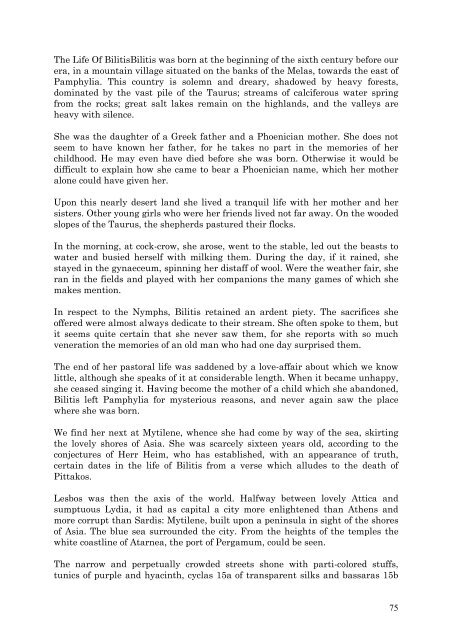You also want an ePaper? Increase the reach of your titles
YUMPU automatically turns print PDFs into web optimized ePapers that Google loves.
The Life Of <strong>Bilitis</strong><strong>Bilitis</strong> was born at the beginning <strong>of</strong> the sixth century before our<br />
era, in a mountain village situated on the banks <strong>of</strong> the Melas, towards the east <strong>of</strong><br />
Pamphylia. This country is solemn and dreary, shadowed by heavy forests,<br />
dominated by the vast pile <strong>of</strong> the Taurus; streams <strong>of</strong> calciferous water spring<br />
from the rocks; great salt lakes remain on the highlands, and the valleys are<br />
heavy with silence.<br />
She was the daughter <strong>of</strong> a Greek father and a Phoenician mother. She does not<br />
seem to have known her father, for he takes no part in the memories <strong>of</strong> her<br />
childhood. He may even have died before she was born. Otherwise it would be<br />
difficult to explain how she came to bear a Phoenician name, which her mother<br />
alone could have given her.<br />
Upon this nearly desert land she lived a tranquil life with her mother and her<br />
sisters. Other young girls who were her friends lived not far away. On the wooded<br />
slopes <strong>of</strong> the Taurus, the shepherds pastured their flocks.<br />
In the morning, at cock-crow, she arose, went to the stable, led out the beasts to<br />
water and busied herself with milking them. During the day, if it rained, she<br />
stayed in the gynaeceum, spinning her distaff <strong>of</strong> wool. Were the weather fair, she<br />
ran in the fields and played with her companions the many games <strong>of</strong> which she<br />
makes mention.<br />
In respect to the Nymphs, <strong>Bilitis</strong> retained an ardent piety. The sacrifices she<br />
<strong>of</strong>fered were almost always dedicate to their stream. She <strong>of</strong>ten spoke to them, but<br />
it seems quite certain that she never saw them, for she reports with so much<br />
veneration the memories <strong>of</strong> an old man who had one day surprised them.<br />
The end <strong>of</strong> her pastoral life was saddened by a love-affair about which we know<br />
little, although she speaks <strong>of</strong> it at considerable length. When it became unhappy,<br />
she ceased singing it. Having become the mother <strong>of</strong> a child which she abandoned,<br />
<strong>Bilitis</strong> left Pamphylia for mysterious reasons, and never again saw the place<br />
where she was born.<br />
We find her next at Mytilene, whence she had come by way <strong>of</strong> the sea, skirting<br />
the lovely shores <strong>of</strong> Asia. She was scarcely sixteen years old, according to the<br />
conjectures <strong>of</strong> Herr Heim, who has established, with an appearance <strong>of</strong> truth,<br />
certain dates in the life <strong>of</strong> <strong>Bilitis</strong> from a verse which alludes to the death <strong>of</strong><br />
Pittakos.<br />
Lesbos was then the axis <strong>of</strong> the world. Halfway between lovely Attica and<br />
sumptuous Lydia, it had as capital a city more enlightened than Athens and<br />
more corrupt than Sardis: Mytilene, built upon a peninsula in sight <strong>of</strong> the shores<br />
<strong>of</strong> Asia. The blue sea surrounded the city. From the heights <strong>of</strong> the temples the<br />
white coastline <strong>of</strong> Atarnea, the port <strong>of</strong> Pergamum, could be seen.<br />
The narrow and perpetually crowded streets shone with parti-colored stuffs,<br />
tunics <strong>of</strong> purple and hyacinth, cyclas 15a <strong>of</strong> transparent silks and bassaras 15b<br />
75








